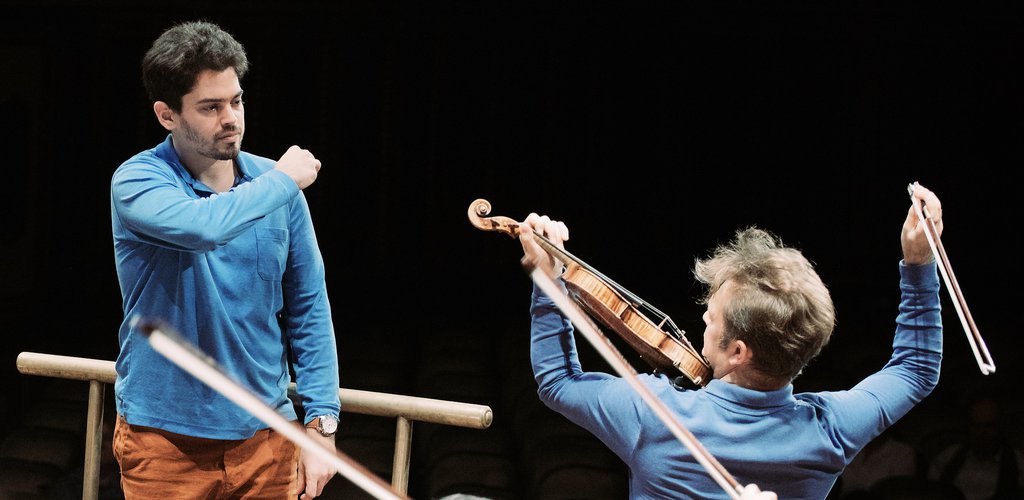"The Budapest Festival Orchestra gave a great performance both in the concerto and in the two Prokofiev pieces, with full-blooded tuttis, polished chamber music sections and ornately shaped solos." Critical review by Kristóf Csengery (Revizor) of our concert conducted by Lahav Shani.
Forty-three-year-old Renaud Capuçon is a favorite for lovers of violin music. He is a sensitive musician with an awe-inspiring technique. Prestigious international competitions won him renown early on in his career, as well as ensembles such as the European Union Youth Orchestra and the Gustav Mahler Jugendorchester – Capuçon became leader of the latter upon Claudio Abbado’s invitation. His chamber partners include Nicholas Angelich, Mark Braley (who are relatively unknown in Hungary, but they are both exceptional pianists) and David Fray, with whom he recently collaborated to produce an outstanding Bach recording. He also takes to the stage together with his likewise world-class younger brother, cellist Gautier Capuçon.
A generation junior to Capuçon, pianist and conductor Lahav Shani’s career’s highlight has so far been with the Rotterdam Philharmonic Orchestra. He is going to succeed Zubin Mehta at the Israel Philharmonic Orchestra in the near future. The two of them performed as guests together with the Budapest Festival Orchestra in a Russian program where the first and third numbers (War and Peace Overture, Romeo and Juliet - excerpts)) were composed by Prokofiev, and the middle one (Violin concerto) by Pyotr Tchaikovsky.
It is often said that vehemently romantic interpretations of Tchaikovsky are in fact alien to his spirit, as a composer who revered Mozart, and that the classical roots of his inspiration should be allowed to shine through in performances of his works. However, there are precious few who can actually put this idea into practice, and are able to display said classical clarity and proportions during a performance. At the Liszt Academy, Renaud Capuçon’s interpretation of the oft-performed Violin Concerto did bring something new and strikingly original to the table: namely the lightness and relaxed way he played, which then rendered all the music he made captivatingly natural. There was nothing showy, forced, or pushy about his melody shaping, dynamics, tone, or accents, – everything unfolded as it should. The concerto that has seen so many effusive and bombastic interpretations became marvelously smooth, while losing nothing of its virtuosic attraction. This was an exemplary performance; it engaged the listener and paired superiority with modesty. The choice of encore was also tell-tale. Instead of a bravura piece, the artist performed, unaccompanied, the minor section of the Dance of the Blessed Spirits from Gluck’s Orfeo, in the crystal clear sound of a violin singing alone.
On the subject of getting acquainted with Lahav Shani, we might have been better off had he chosen to conduct only a single Prokofiev piece instead of two, and a different second work by another composer, which would have allowed us to get a broader picture of his personality. As it stands, the concert projected a more unified, but less informative picture. With a young conductor, the first meeting isn’t always sufficient to get a good understanding of who we are dealing with. The situation is easier with a pianist or violinist: you can get to know more of an instrumentalist during a single evening than of someone who directs an ensemble, but thus only makes music indirectly. However, it was already obvious that Lahav Shani is a strong character who conducts with deliberate and clear gestures, likes powerful sound effects, stark contrasts and pronounced accents. He conducted both the rarely heard War and Peace Overture and the much better known Romeo and Juliet movements colorfully, but in both cases this richness of textures meant that he brought into the spotlight the many harsh, raw effects, crassness, even savagery that are unarguably present in the works. This is not a negative remark, since these attributes are essential parts of Prokofiev’s personality, and it was a joy to experience that the conductor dared to express the extreme characteristics within the compositions instead of trying to falsely smooth them out. On the other hand, we will get to know Lahav Shani better when he returns to Hungary with other composers’ works that feature different textures and tones.
You can read the original article in Hungarian clicking here.
